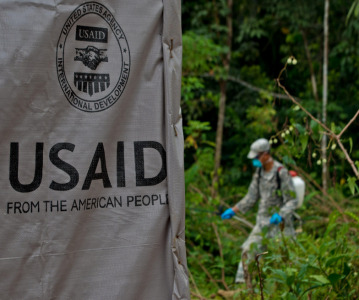Africa’s first COVID-19 vaccine plant receives no orders since launch
.jpg)
The first COVID-19 vaccine plant in Africa is at risk of closure due to lack of demand.
South Africa-based Aspen Pharmacare, who operates the plant, struck a licensing deal to package and sell Johnson & Johnson's COVID-19 vaccine at the end of 2021, with plans to distribute the vaccine around Africa under the name Aspenovax.
However, an Aspen executive confirmed to journalists last week that no orders for Aspenovax have been received, throwing future production into question.
Aspen senior director Stavros Nicolaou told Reuters: ‘If we don't get any kind of vaccine orders, then clearly there'll be very little rationale for retaining the lines that we're currently using for production’.
The issue was first highlighted at a press briefing on April 14, where Africa CDC Director John Nkengasong told journalists that countries are not ordering the vaccine. He added that if this situation continues ‘the risk is very, very high that the company [Aspen] may actually stop producing the J&J COVID vaccines’.
He noted that countries are reluctant to pay for Aspen's vaccine doses because supply issues have eased in 2022 and hundreds of millions of free doses are now widely available.
The launch of Aspen’s vaccine was originally hailed as a ‘transformative moment’ by the World Health Organization (WHO), who said it would help to address inequality in vaccine access.
Negotiations between Johnson & Johnson, Aspen and the African Vaccine Acquisition Trust began in November 2021 and a deal for 400 million doses was agreed in March. Speaking when the deal was announced, Strive Masiyiwa, African Union special envoy on COVID-19, said: ‘It gets us one step closer to securing Africa's future vaccine production and ensures that the gross vaccine inequality we witnessed in the early part of the pandemic is not repeated’.
Although supply has increased significantly this year, Africa has struggled to bring up its vaccination rate- citing issues with cold chain storage, lack of skilled staff and vaccine hesitancy.
According to Africa’s CDC, just under 16% of the population have received two vaccine doses and 1.33% have received the booster. Just 66% of Africa’s vaccine supply has been used so far.
Ramp-up in local vaccine production
Earlier this year, the African Union announced the goal of producing 60% of all vaccines administered in Africa locally by 2040, up from the current 1%. Several plants are being set up to meet this goal.
In March, Moderna announced that it signed a Memorandum of Understanding with Kenya’s government for its first mRNA manufacturing facility in Africa. It stated that it would produce up to 500 million vaccine doses a year for the continent.
BioNTech is also setting up modular mRNA manufacturing facilities in Senegal, Rwanda, and South Africa, while production of the Sinovac COVID-19 vaccine is already underway in Egypt.
After Aspen reported the lack of demand for its vaccine, some public health analysts have raised concerns over the future success of other, similar initiatives.
Aspen senior director Stavros Nicolaou said: ‘If Aspen doesn't get production, what chance is there for any of the other initiatives?’
Related News
-
News US FDA adds haemodialysis bloodlines to devices shortage list
On March 14, 2025, the US FDA published an open letter to healthcare providers citing continuing supply disruptions of haemodialysis bloodlines, an essential component of dialysis machines. -
News Women in Pharma: Manufacturing personal and team success
Our monthly Women in Pharma series highlights the influential lives and works of impactful women working across the pharmaceutical industry, and how the industry can work towards making the healthcare industry and workplace more equitable and inclusive... -
News Pfizer may shift production back to US under Trump pharma tariffs
At the 45th TD Cowen annual healthcare conference in Boston, USA, Pfizer CEO Albert Bourla outlined the potential for Pfizer to shift its overseas drug manufacturing back to the US as pharmaceutical industry players weigh their options against Presiden... -
News Experimental drug for managing aortic valve stenosis shows promise
The new small molecule drug ataciguat is garnering attention for its potential to manage aortic valve stenosis, which may prevent the need for surgery and significantly improve patient experience. -
News Women in Pharma: Connecting accessible pharma packaging to patients – a Pharmapack Special
Throughout our Women in Pharma series, we aim to highlight how CPHI events encourage discussions around diversity, equity, and inclusion initiatives in the pharmaceutical industry. -
News Vertex Pharmaceuticals stock jumps as FDA approves non-opioid painkiller
UK-based Vertex Pharmaceuticals saw their stock shares soar as the US FDA signed off on the non-opioid painkiller Journavx, also known as suzetrigine, for patients with moderate to severe acute pain, caused by surgery, accidents, or injuries. -
News Trump administration halts global supply of HIV, malaria, tuberculosis drugs
In various memos circulated to the United States Agency for International Development (USAID), the Trump administration has demanded contractors and partners to immediately stop work in supplying lifesaving drugs for HIV, malaria, and tuberculosis to c... -
News 2024 Drug Approvals: a lexicon of notable drugs and clinical trials
50 drugs received FDA approval in 2024. The centre for biologics evaluation and research also identified six new Orphan drug approvals as under Biologics License Applications (BLAs). The following list picks out key approvals from the list, and highlig...
Position your company at the heart of the global Pharma industry with a CPHI Online membership
-
Your products and solutions visible to thousands of visitors within the largest Pharma marketplace
-
Generate high-quality, engaged leads for your business, all year round
-
Promote your business as the industry’s thought-leader by hosting your reports, brochures and videos within your profile
-
Your company’s profile boosted at all participating CPHI events
-
An easy-to-use platform with a detailed dashboard showing your leads and performance







